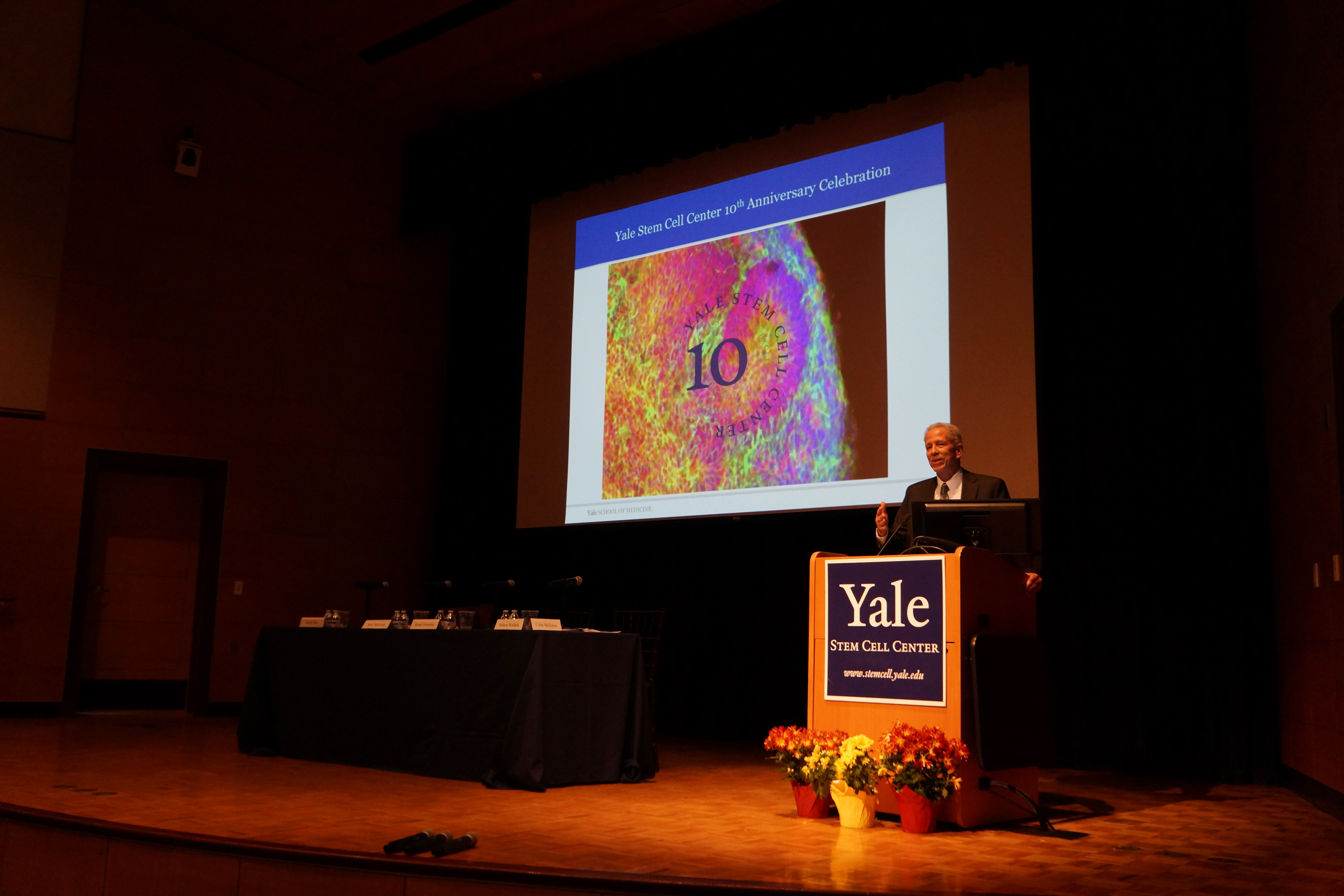
Ellen Kan
Last week, stem cell researchers from across the nation converged at the Yale School of Medicine to celebrate the 10-year anniversary of the Yale Stem Cell Center — one of America’s most prominent centers for stem cell research.
Since its 2006 founding by cell biology professor Haifan Lin, the Yale Stem Cell Center has grown into a vast network spanning 27 departments and 93 labs. To celebrate this milestone, the center hosted a ceremony on Nov. 10, followed by a full-day scientific symposium on Nov. 11. The ceremony featured remarks from University President Peter Salovey and Dean of the School of Medicine Robert Alpern, as well as Gov. Dannel Malloy, Mayor Toni Harp, Sens. Richard Blumenthal LAW ’73 and Chris Murphy, D–Conn., and Rep. Rosa DeLauro, D-Conn.
The city and state leaders spoke highly of the center’s progress, emphasizing the facility’s strengths in carrying out cutting-edge research and training young scientists. In particular, Harp praised the center for encouraging local development, as well as placing New Haven in the “crosshairs” of groundbreaking scientific research.
“As mayor, I’m so proud to describe New Haven, Connecticut, as the home of this world class operation, its world-class staff [and] its worldwide implications,” Harp said.
DeLauro echoed Harp’s sentiment, describing the center as an “incubator for scientific discovery,” while Murphy and Malloy stressed the importance of continued financial support for stem cell research. In his speech, Malloy highlighted the fact that Connecticut contributed just under $38 million to Yale for regenerative research projects between 2010 and 2015, while Murphy pointed out that the state conducts 6 percent of all stem cell research in the country.
The opening ceremony was followed by a panel discussion on stem cell research, which featured prominent leaders in the field. During the discussion, moderated by WNPR host Colin McEnroe, panelists addressed issues ranging from the global impact of stem cell research to future challenges facing researchers.
The anniversary celebration was an opportunity to reflect on 10 years of progress, thank the center’s supporters and enable the center’s members to exchange their discoveries with a broader research community, Lin said. The symposium highlighted research projects by both guest scientists and members of the Yale Stem Cell Center. According to Lin, approximately 370 people attended the event, making the symposium one of the School of Medicine’s largest ever departmental or center-led activities.
“I thought [the symposium] was uplifting,” said Helen Blau, a speaker at the event and the director of Stanford University’s Baxter Laboratory for Stem Cell Biology. “The breadth and depth of the center are remarkable, and I was particularly excited about what I learned from the junior professors. I thought they were doing remarkable research.”
In an interview with the News, Lin said that since its founding, the center has focused primarily on researching the basics of stem cell behavior, in addition to developing disease-oriented programs. He added that by focusing on basic research, even if the center’s “discoveries are not immediately applicable for translational research,” they provide guiding principles for the whole field, and that such a focus is in line with Yale’s standing as a leader in research.
“Even today, we still know relatively little about stem cells — they’re probably the least-understood type of cells,” Lin said. “If we don’t fully understand the principle that is underlying stem cell behavior, there will be bigger problems down the road in rationally designing ways to harness the power of these cells.”
Alpern also emphasized the importance of focusing on basic research, adding that the center has continued to thrive and evolve over the past 10 years. He attributed the success of the center in part to the excellent leadership of Lin, to whom he referred as an “intellectual giant.”
Center affiliates, as well as city and state leaders expressed hope that the center will continue to push the boundaries of stem cell research. However, many also expressed concerns regarding future funding, particularly in light of the recent election results and the uncertainty surrounding the Donald Trump administration’s position on science and research. Blau told the News that she is “quite worried about the future” of stem cell research, particularly since the current funding situation is not ideal.
“I worry about losing young researchers because of the struggle of raising the necessary funds to pursue their research and fund their labs,” Blau said.
She added that she hopes scientists will be proactive in rallying for the government to focus on scientific research, rather than waiting passively to see what happens.
According to Blumenthal, although Yale and the state of Connecticut may encounter funding hurdles in the coming years, state, city and University leaders are “prepared to fight these battles.”
“It is part of who we are, at Yale and [in] Connecticut, that we believe in scientific research — and yes, facts,” Blumenthal said in his speech. “We cannot deny science, we cannot get in the way of human progress [and] we need to support with even greater determination and dedication, the kind of great research that is done here at Yale.”
According to Lin, stem cell-related research at Yale has created 214 high-tech jobs, among many other indirect employment opportunities, and has started four biotech companies.







